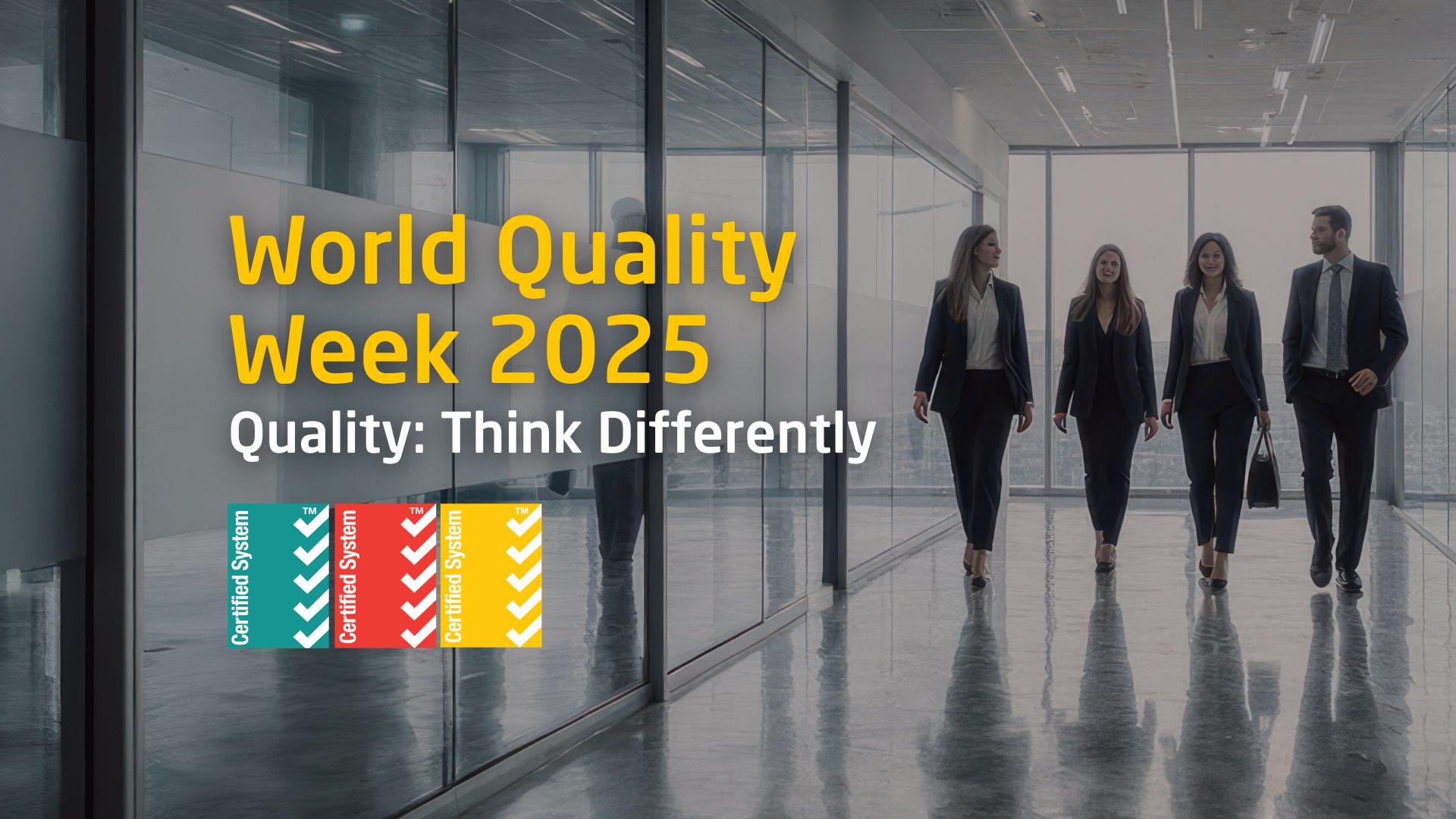9 mins read


World Quality Week 2025 takes place from 10-14 November, 2025, and this year’ theme is “Quality: think differently”. This is a time for a global celebration of quality and includes World Quality Day on 13 November 2025.
It encourages organisations and individuals to challenge traditional quality management approaches and embrace new ways of thinking to drive excellence.
To find out more about the crucial role of Quality Management, we spoke to experts from Intertek SAI Global to get firsthand insights into the world of quality.


Foundations of Quality Management
With Ross Guastalegname, Director of Operations, Intertek SAI Global
What does “Quality: Think Differently” mean to you in the context of assurance and auditing?
To me, thinking differently is about challenging the perception that quality and auditing are just about compliance or ticking boxes. It’s about looking at assurance as a way to drive improvement and resilience.
Thinking differently means engaging with organisations to see quality as a mindset, not a milestone. It’s about asking the right questions that encourage innovation, collaboration, and accountability, so that quality becomes embedded in how decisions are made every day, not just when an audit is scheduled.
How have you seen the principles of quality management evolve over time?
When I started auditing, quality management was often focused on procedures and documentation, making sure everything was followed to the letter. Over time, it’s become much more dynamic.
Today, we see quality systems that are integrated with business strategy, risk management, and sustainability goals. The principles of leadership, engagement, and continual improvement are now at the forefront. Organisations are realising that quality isn’t something you have to do, it’s something that helps you do better business.
The evolution has really been from control to collaboration, and from compliance to culture.
How are organisations rethinking their approach to quality today?
Organisations are starting to view quality as a driver of trust and performance rather than just an operational requirement. Many are embedding quality thinking into their strategic objectives, linking it with sustainability, customer experience, and digital transformation.
I’ve also seen a big shift towards using data and insights from audits more effectively. Rather than treating findings as problems to fix, organisations are analysing them to identify trends, strengthen leadership accountability, and innovate processes.
Ultimately, rethinking quality means seeing it as everyone’s responsibility, from the boardroom to the front line and recognising that quality underpins resilience, reputation, and long-term success.


The role and value of quality
With Shelia Lee, Head of Quality, Intertek SAI Global
Why do you think quality management remains so essential to business success?
Quality management is fundamental because it creates consistency, credibility, and confidence, three things every successful organisation depends on.
In a world where expectations around sustainability, data integrity, and social responsibility are higher than ever, quality management provides the structure to deliver on those promises. It helps organisations align their systems, people, and strategy so they can deliver outcomes that are reliable and continually improving.
At its core, quality isn’t just about meeting requirements, it’s about enabling performance, resilience, and trust. Businesses that take quality seriously are the ones that adapt faster, manage risk better, and build stronger reputations over time.
What are some of the biggest benefits you’ve seen when organisations embed quality thinking across all levels, not just in compliance?
When quality thinking is embedded across every level of an organisation, it stops being a department and starts becoming a culture.
I’ve seen teams make faster, more informed decisions because they have clear processes, meaningful data, and a shared understanding of what “good” looks like. It improves collaboration and accountability, people feel more empowered to identify issues and contribute to solutions.
Beyond operational benefits, this approach also fosters innovation. When everyone is thinking about improvement, it sparks creativity and drives better outcomes for customers, employees, and the environment. That’s when you start to see quality not as a cost of doing business, but as a competitive advantage.
How does a focus on quality contribute to building trust, both within an organisation and with its customers or stakeholders?
Trust is built on evidence, and that’s exactly what quality management provides. It gives stakeholders confidence that what you’re saying aligns with what you’re doing.
Internally, quality systems create transparency and consistency, which strengthens collaboration and confidence among teams. Externally, they demonstrate reliability to customers, partners, regulators, and investors.
For example, delivering a product that performs as promised, quality provides the assurance that commitments are credible and measurable. That’s why we issue the ‘5 Ticks’ StandardsMark™ on a product or management system as an independent assurance to the customer that the organisation has undergone a rigorous audit and evaluation program.
In that sense, quality is the language of trust, it’s how organisations prove their integrity through action and verification.


Quality and sustainability into measurable action
With Ben Reick, General Manager Sustainability, Intertek SAI Global
How does quality management contribute to broader societal goals, such as sustainability, safety, or wellbeing?
Quality management helps organisations turn big commitments, such as cutting emissions, improving worker wellbeing, or tackling modern slavery, into real, measurable action. The same principles that drive quality, such as leadership, accountability, evidence-based decisions and continuous improvement, are also the foundation for sustainability and social responsibility.
A good quality system does more than track results; it helps make sure they are achieved in the right way.
Quality is also critical in how we measure, report and communicate progress on sustainability goals. When quality principles are applied well, they create efficiencies that deliver real benefits such as improved work life balance, higher productivity, reduced waste and lower emissions. These efficiencies not only strengthen business performance but also support broader environmental and social outcomes.
At its heart, quality management connects good intentions with real outcomes. It gives businesses the structure to deliver lasting benefits for people, the planet and long-term success.
How do audits shape a culture of quality that extends beyond compliance into social responsibility?
Audits play an important part in shaping a culture of quality that goes beyond compliance. A good audit does more than confirm that processes meet requirements, it helps identify ways to improve and align business practices with values such as sustainability, ethics and transparency.
Auditors have a unique view across industries, which allows them to share insights and highlight how strong systems can also create social and environmental value. When an audit becomes a genuine conversation about purpose and accountability, it encourages people to see quality as part of how they contribute to society, not just a standard to meet.
At a deeper level, audits build trust. They give people confidence that what an organisation says about its impact and intentions can be relied upon. In a world where transparency and accountability matter more than ever, the audit process helps bridge the gap between words and action.
In this way, audits move from being a control exercise to becoming a catalyst for continual improvement, ethical leadership and lasting positive change.


The future of quality
With Hussain Riaz, Scheme Program Manager for IT and AI, Intertek SAI Global
As technology, AI, and data analytics reshape industries, how do you see quality management adapting?
In the era of AI, true excellence lies in creating systems that are not only intelligent but also safe. This embodies the essence of genuine quality. Achieving this requires deliberate and sincere efforts to embed quality into every stage of product development and service delivery. Today marks the beginning of a new chapter, one defined by Human & AI collaboration in the pursuit of quality. When AI learns with precision and acts with responsibility, quality transcends being a mere objective and becomes a guarantee.
The most pressing priority is to ensure transparency, continuous bias monitoring, and traceability within AI models, thereby extending the principles of quality management to encompass algorithmic accountability. This evolution will be fundamental in building and sustaining trust in quality.
Infact, Intertek SAI Global have recently launched the new Data Trust Tricertification, an integrated certification pathway designed to help organisations protect data, safeguard privacy, and govern artificial intelligence (AI) with confidence.
The Data Trust Tricertification brings together three globally recognised standards under one comprehensive certification program:
ISO/IEC 27001 – Information Security Management Systems
ISO/IEC 27701 – Privacy Information Management Systems
ISO/IEC 42001 – AI Management Systems.

